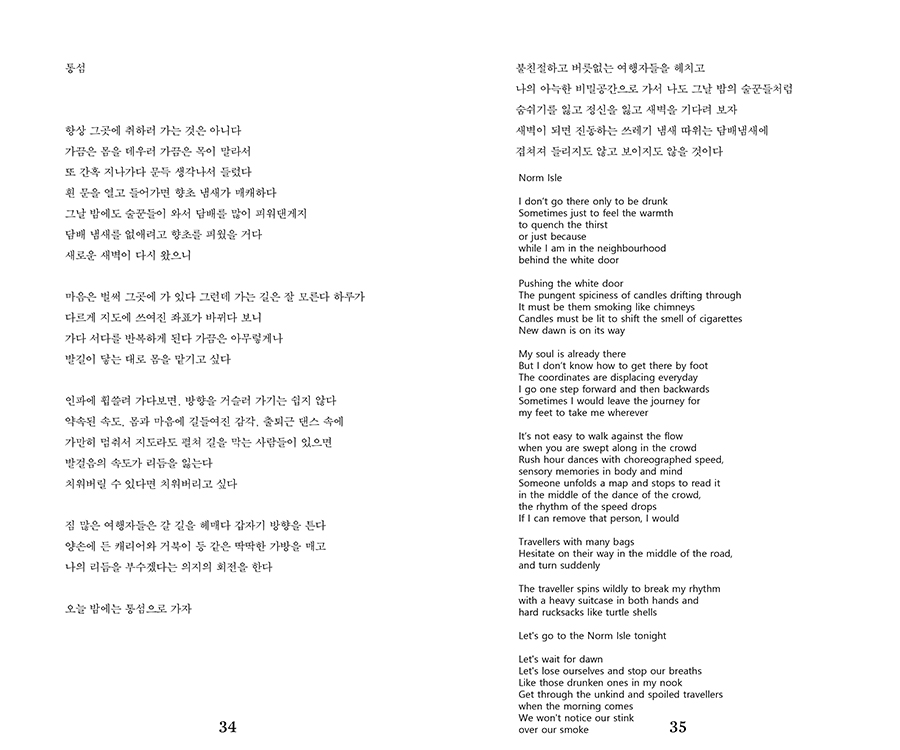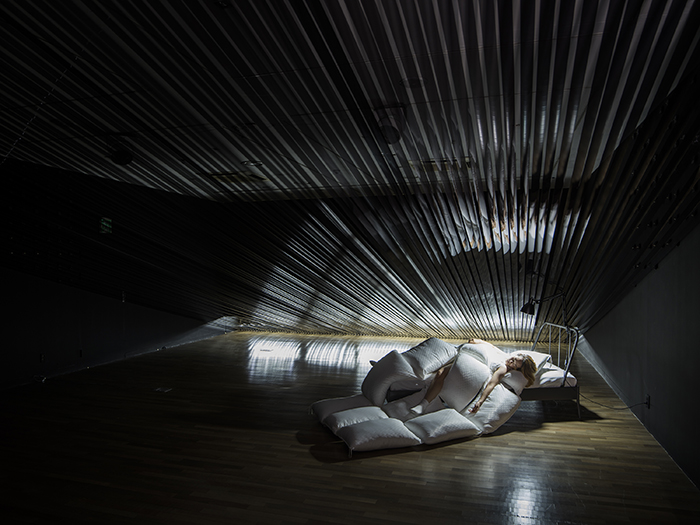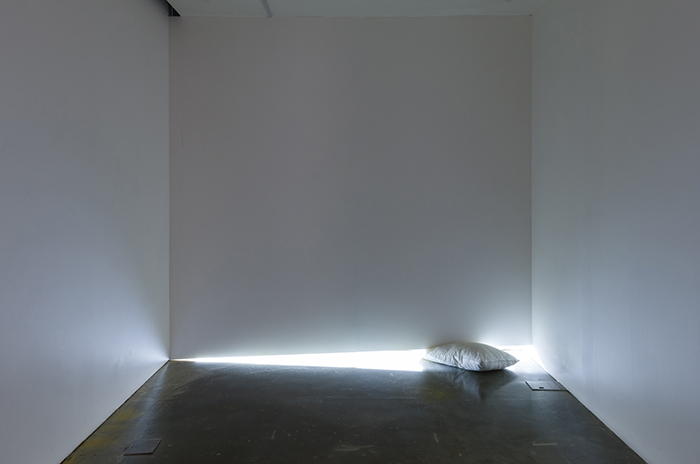
Hye-Soo Park is an artist who continues to reveal her own artistic analysis on the modern man struggling to live the average life in a fiercely competitive society, the psychological issues derived from such life and the social landscape of our modern generation. Through various projects, Park continues to develop a visual analysis from speculating about the disappearing values of an individual’s life under capitalism, and following up on people’s thoughts about it. Her work “Project Dialogue-Archive”(2009) initiated the first of these interactive communications, was setup to induce conversation in which professionals of different fields and the general audience posted feedbacks in their own manners, resulting in a conversation scrapbook of randomly overheard and collected conversations of people. Through this project, Park divided the collected conversations and her own thoughts into five themes of dreams, botong*, love, money and art, and carried out surveys for each theme as five separate projects.
In this exhibition “Now Here Is Nowhere”, the artist shows recent works which are elaborated from her earlier research project <Project Dialogue vol.2-the Definition of Botong> shown in the 13th SongEunArtAward in 2013. The concept ‘botong’, which has become as a very standard terminology, was considered as the reason for the loss of the themes such as ‘dreams’ and ‘love’ in modern times. Park focused on the dual nature of ‘botong’ as the universal value that must be aimed for and the subjective standard for self-justification at the same time. She visualized the concept of ‘botong’, based on her survey results since 2013 and the cooperative work with psychiatrist Yumi Sung, which invoked viewers to query their meaning of ‘botong’.
Park divided SongEunArtSpace into three levels; <Reality - Bottom Life>, <Standardized Botong - Average Life> and <Distorted scenes of Botong> and placed text works, installations and audience participation on each corresponding floor comprising a total of 18 works.
1F-Reality Bottom Life
 |
 |
World's Best, 2016, Metal structure, stainless steel, flag, light, mirror, light, 600(w)x400(d)x820(h)cm

Gloomy Monday_2015, clipping from the Monday edition of The Guardian(UK:Nov~Dec 2015) and Chosun Daily Newspaper(KR:Aug~Sep 2015), melody box, loudspeaker,
 |
 |
 |
 |
This work is the 2nd edition of the work 'Negative Song'(2015)


2F-Standardized Botong-Average Life

<Standardized Botong - Average Life> level, 10 abstract poems are presented which were written by a conceptual artist, Taey Iohe, based on the artist’s results from the ‘survey on Botong’ from over 700 people since 2013_Poem by Taey Iohe
The artist takes the ambiguous nature of the standard called “average” and the standardized lives of modern day people trying to make it in a society where all things that lie outside conventional standards are cast out, and terms them together as the “Standardized Botong – Average Life”. The first room of the third floor presents A0 to A8 (2016), a stainless steel mirror work that has differing standardized paper sizes hangs from the ceiling to display only partial reflections of viewers or the space itself. Accompanying this piece is an installation and object works Untitled (2016) and My Confession (2016) that consist of ten abstract poems by the conceptual writer Taey Iohe – who was asked to base his poems on the open-ended survey responses of the 700-participant “Test for the Average” of 2013 along with Park’s own interpretations.
Park scatters excerpts of Iohe’s poems in inconspicuous locations around the gallery and stair well in an attempt to have the entire gallery space read as one giant text form.

A0 to A8, 2016, stainless steel mirror, variable dimensions
 |
 |
 |
 |
My Confession, 2016, Mayfly, pencil text, variable dimensions
Untitled, 2016, Mixed media, variable dimensions

Veriable Average Beam,2016, Metal structure, laser level, dimensions (SOMA Museum. Sep. 2016)
3F-Distorted scenes of Botong
The “Distorted Scenes of Botong” laid out on the fourth floor brings into perspective the precarious people of a brutally competitive society who regard everyone who are not winners as failures and side-liners, using object d’art works.

City Poem, 2016, Mixed media(found object from the streets in Korea, UK, photo, monitor, map, poem by Taey Iohe), variable dimensions
Walking in the exhibit space, audiences can see City Poem (2016) covering the entire right wall and corners with the comprising sub-works The Story inside the Pocket (2016), an array of worry-ridden objects of people gathered from the streets of Korea and the UK, and Following (2016), a project about roaming through the city by following random people going in front.
 |
 |
 |
Collecting messages dropped in the street. " Walking in the footsteps of the person in front of me.

 |
 |

H.E.L.P, 2018, 500 clock move, pillow cover, pillow, light, photo, trumpet, variable dimensions
Performer: Jimin Son Music: Seongwhan Jung
* H.E.L.P. (2016~) installed in a sectioned off room uses Park’s own suffering of insomnia to show a portrait of the people of today living with psychological ailments resulting from their incessant worries of the future.
 |
 |
 |
|

 |
 |
 |
1,875 days of lonely home_2016_mixed media, variable dimensions
World's Best Series

Game World's Best, 2016, wood block, trophy symbol, chess clock, monitor, variable dimensions. (player. Taehui, Kim) _MCAB Collection
 |
 |
 |
 |
 |
Hye-Soo Park: Now Here Is Nowhere captures “the average-made life” found in our everyday moments and reinterprets findings visually using an artist’s perspective, forcing us to face and question the problems of modern society that we try so hard to ignore, and to reevaluate the lives of people today that is not normal but considered average.
 |
 |
|
Publication: series of Nowhere (2015~2016): logo, poster, book, catalog design by, Dongyoung Lee
Hye-Soo Park (b. 1974) received a BFA and a MFA in sculpture from Ewha Womans university. Starting with her first solo exhibition “The Depth of Time” at Deockwon Gallery in 2000, she had 12 solo exhibitions and has since participated in important group exhibitions, including ‘Sema 2010-Chasm in Image’, SeMA, Seoul, Korea (2010), ‘No.45-Kumho Young Artist’, Kumho Museum, Seoul, Korea (2012), ‘The Future is Now’, MAXXI Museum, Rome, Italy (2014) and ‘APMAP - Researcher's Way’, Amore Museum, Yongin, Korea (2015). She was chosen for the 10th Kumho Young Artist (2010) and participated in Goyang National Art Studio Residency Program (2010), Jan Van Eyck Academie Residency Program (2014) and Gasworks Residency (2015) in London, U
